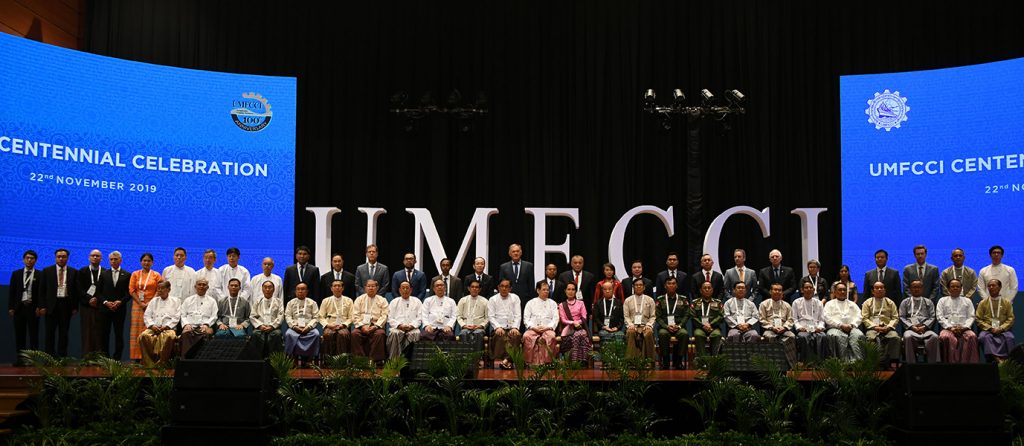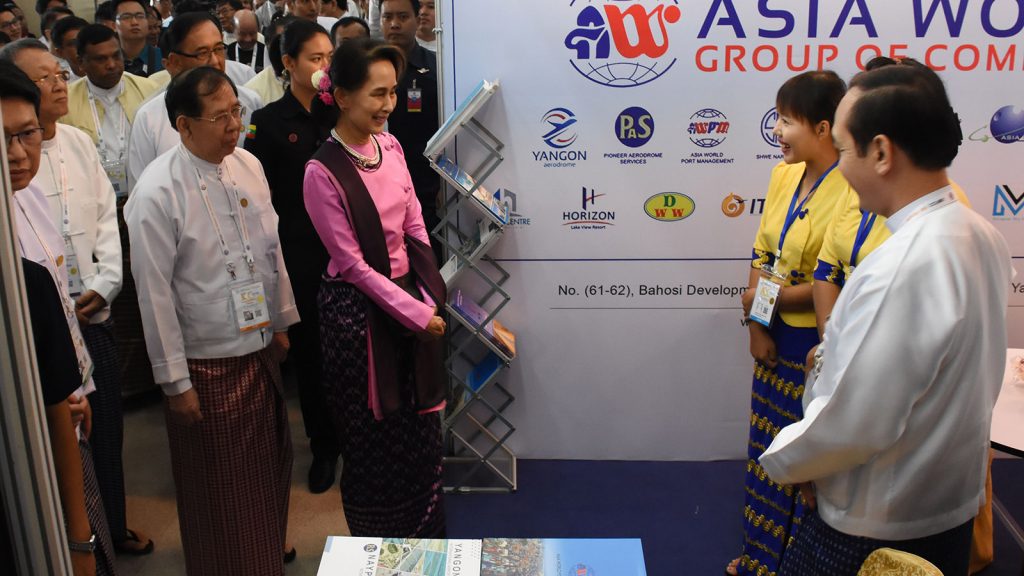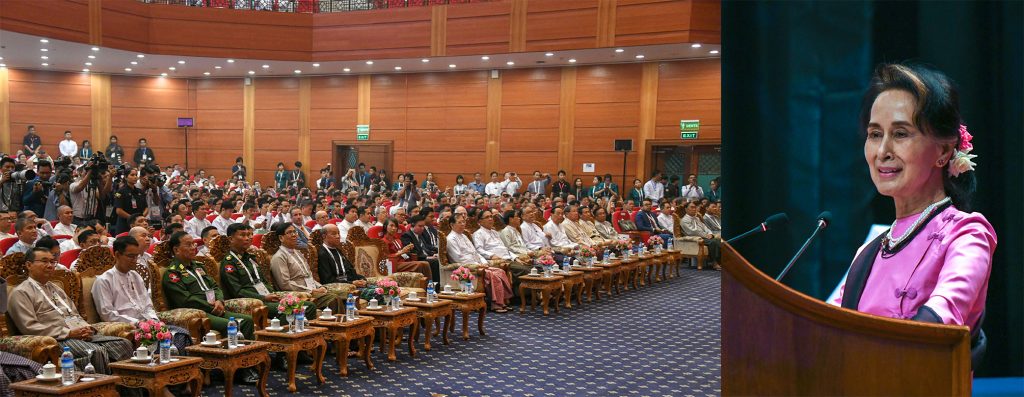November 23, 2019
State Counsellor Daw Aung San Suu Kyi addressed the Centennial Celebration of the Union of Myanmar Federation of Chambers of Commerce and Industry (UMFCCI) held at the Myanmar International Convention Centre II (MICC-II) in Nay Pyi Taw yesterday morning.
In addressing the event State Counsellor Daw Aung San Suu Kyi said UMFCCI had 75 sister organizations and was established all over the country in states and regions covering all business sectors. In international relations, it has signed 167 MoUs with chambers of commerce of various countries and business organizations cooperating for development of trade and investment.
In implementing UMFCCI’s aims and work processes it not only works hand in hand with development partners but also cooperates and works closely in public-private cooperation programmes for national economic development. The Government on its part had selected UMFCCI for its size, representation and international contacts as an organization representing the private sector. It was expected to participate and work effectively in the country’s economic development processes.
As the private sector has been determined to be the main driving force in the socio-economic development of the country, a Private Sector Development Committee led by Vice President U Myint Swe was formed in October 2016 to support the private sector in all work sectors. At the moment five work committees have been formed with relevant union ministerial departments and state/region governments to coordinate the works and resolve difficulties faced by private businesses.

Setting aims and goals in all sectors for a country to develop economically would require financial investments, technical knowhow, human resources and basic infrastructures.
There are limitations and constraints for the country’s government and private sector in jointly cooperating and fulfilling these requirements. Especially developing countries like
Myanmar need a lot of investments and technical knowhow.
That was why every country was competing in inviting foreign investments that would bring in investments and technical knowhow.
In the World Bank Ease of Doing Business Index for 2020 published on 24 October 2019, Myanmar obtained 46.8 points. This was an increase of 3.3 points from last year’s 43.5. The ranking has also increased 6 positions from last year’s 171. Myanmar’s inclusion in the top 20 progressing countries in Ease of Doing Business Index for 2020 was a significant result. Yet Myanmar would continue to strive harder. There was progress in five indices and this was the outcome of cooperation between the government and the private sector. These good results need to be maintained while efforts were required to be made in making it easier to do things in other work sectors and various other types of business.
Myanmar established a Myanmar Sustainable Development Plan (MSDP) 2018-2030 in the year 2018. Goal 3 of MSDP was job creation and private sector-led growth. Policies and regulations were set for good businesses to develop and to include and use in a good administrative system. In addition to this, work processes to remove administrative sluggishness and bottlenecks are being implemented to increase the pace of reforms.”
Micro, small and medium enterprises (MSMEs) play a main role in creating jobs, national innovation, prosperity, poverty reduction and human resources development. For such an important sector to develop, works were conducted to assure its sustainable existence, participation and quality development. MSMEs on their part need to create a conducive environment for investment to enter in order to change according to time and era, manage and face difficulties and to use new technologies.
Together with the MSDP, regional value chains for ASEAN integration, effective use of Cyber technology for connectivity among the peoples would be employed in Myanmar 4.0 to use modern systems including non-cash payment systems, education for all and in obtaining news and information. As smart phone usage had passed 100 per cent in Myanmar, smart phones can be used in various works in our daily life. It was very satisfying to know of UMFCCI’s active participation in MSMEs development and establishment and development of Myanmar 4.0. As public-private cooperation was required for economic development of the State, reform, development in digital economy and Myanmar businesses expanding internationally, UMFCCI was expected to continue leading the private sector.
In conclusion, may the UMFCCI centennial ceremony create a bright future of all businesses in all of Myanmar. May UMFCCI’s relentless efforts and future work processes bring forth success. May it provide better and effective work plans to the State. May it strengthen the private sector required for national economic development. Although it has been termed government and private sector, in the end it was all the people of Myanmar. Whatever works would not be successful without the people’s participation. UMFCCI was believed to continue its effort toward the development of the country and all the people living in it, said the State Counsellor.

Afterwards, the State Counsellor, Pyithu Hluttaw Deputy Speaker, Amyotha Hluttaw Deputy Speaker, Union Ministers, Union Attorney General, Nay Pyi Taw Council Chairman, Anti-Corruption Commission Chairman, UMFCCI patron, president and vice presidents, CEC member, EC members, advisers, local business persons, ambassadors and representatives of international business organizations took a commemorative group photo.
UMFCCI was first established in 1919 during the colonial period. After the country gained independence in 1948, it became Union of Burma Chambers of Commerce and Industry (UBCCI) until 1988. As the country moved towards market economic system in 1989, it became the UMCCI and worked towards development of local businesses.
By 2014, as the State gave priority to the private sector for the country’s economic development, the UMFCCI became an organization that led the private sector.
Also present at the event were Pyithu Hluttaw Deputy Speaker U Tun Tun Hein, Amyotha Hluttaw Deputy Speaker U Aye Tha Aung, Union Ministers, Union Attorney General, Nay Pyi Taw Council Chairman, Anti-Corruption Commission Chairman, Deputy Ministers, Nay Pyi Taw Council members, Hluttaw representatives, Permanent Secretaries, heads of department, UMFCCI Patron U Chit Khaing, President U Zaw Min Win and Vice Presidents, members and invited guests. — MNA (Translated by Zaw Min)


